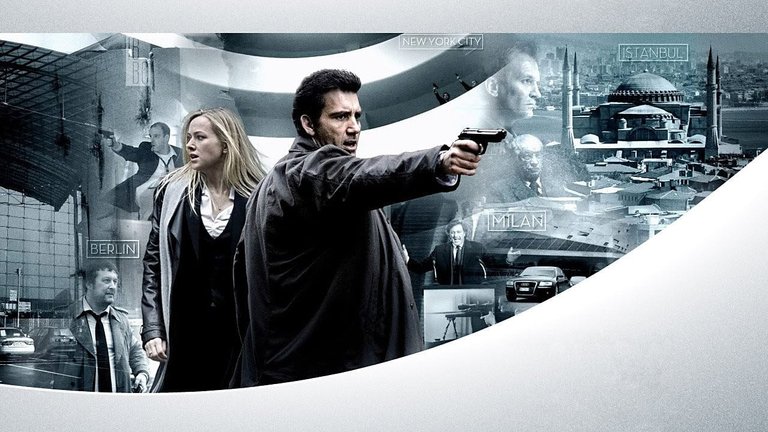
Cryptocurrency enthusiasts, whenever they step outside their social media echo chambers, face a stark reality: for most people, cryptocurrencies are viewed as either worthless or, worse, as tools exploited by fraudsters, drug dealers, terrorists, and money launderers. This sentiment fuels calls for stringent regulations or outright bans on cryptocurrencies, advocating instead for the stability and trustworthiness of fiat currencies and traditional banking systems. Ironically, while some incidents involving cryptocurrencies lend credence to these negative perceptions, it is traditional finance that has historically facilitated a range of fraud, embezzlement and money laundering, leading to numerous high-profile financial scandals that easily dwarfed and continue to dwarf the worst criminal outrages of the crypto world.
Hollywood has been notably hesitant to tackle those banking scandals. This reluctance can be attributed to various factors: the industry's financial ties to the very institutions it might critique and the inherent challenge of rendering white-collar crime into a thrilling cinematic experience. These challenges confronted Tom Tykwer as he directed 2009 thriller The International.
The protagonist of the film is Louis Sallinger, portrayed by Clive Owen, an Interpol agent who has dedicated years to investigating the International Bank of Business and Credit (IBBC). This Luxembourg-based institution wields immense power and influence, entangled in activities such as money laundering and arms trafficking. Sallinger's investigation is helped by Eleanor Whitman (Naomi Watts), a Manhattan Assistant District Attorney. Together, they seek to uncover the truth behind the death of Sallinger's partner, who perished under suspicious circumstances while gathering intelligence from mysterious informant within the bank. Their pursuit leads them to Milan for a meeting with Umberto Calvini (played by Luca Barbareschi), an Italian businessman with political ambitions who recently thwarted IBBC’s lucrative deal. Calvini soon afterwards dies in assassination at a rally, and the crime is attributed to Red Brigade extremist; however, Sallinger discovers the real culprit —top professional assassin known only as “the Consultant” (played by Bryan F. O’Byrne), who operates from New York City.
The film's release coincided fortuitously with the aftermath of the 2008 Wall Street crash, making its themes particularly resonant. The portrayal of global bankers as ruthless villains struck a chord with audiences disillusioned by financial institutions' role in economic turmoil. However, despite this timely context, The International struggled to capture widespread acclaim or recognition, quickly fading into relative obscurity.
A significant factor contributing to this lacklustre reception lies in the film's overall approach. Unlike Adam McKay’s later work The Big Short, which tackled similar themes through sharp satire and dark humour, The International opts for a more serious, sombre approach, drawing inspiration from banking scandals in 1970s and 1980s, such as those that inspired The Godfather Part III.
Moreover, Tykwer and Singer draw heavily from 1970s dark conspiracy thrillers like The Parallax View and Three Days of the Condor, which depict protagonists embroiled in dangerous and quixotic quests against faceless yet all-powerful and seemingly unstoppable entities. These films often explore themes of paranoia and helplessness in confronting systemic corruption—a narrative thread that resonates throughout The International. This choice of direction may have contributed to the film's lack of impact on audiences, who were already reeling from the unprecedented economic crisis and may not have been in the mood for an extra dose of bleakness.
In an attempt to counterbalance this darkness, Tykwer infused The International with visually striking locations in Milan and Istanbul and high-octane action sequences, including a notable shootout at New York’s Guggenheim Museum, a very impressive scene shot at spectacular set made in famous Babelsberg studios. However, this combination of serious political commentary and glamorous globe-trotting intrigue doesn’t work well, sometimes making the film look more like cheap copy of James Bond adventure than a genuine thriller.
One of the film's most significant shortcomings is its character development—or lack thereof. Clive Owen's portrayal of Louis Sallinger suffers from poorly written dialogue and motivations that leave him feeling underdeveloped despite Owen’s undeniable talent. Naomi Watts's character is similarly underutilised; her role often reduces her to mere eye candy rather than allowing her character to contribute meaningfully to the narrative. The decision to make her character American appears driven by an attempt to appeal to North American audiences rather than serving any narrative purpose.
Ultimately, The International serves as an adequate yet forgettable thriller that intermittently attempts to illuminate uncomfortable truths about global finance and corruption. While it raises pertinent questions about accountability within powerful institutions, it fails to deliver these messages with the coherence or impact achieved by filmmakers who possess a clearer vision or by documentary filmmakers who tackle these issues head-on.
RATING: 5/10 (++)
Blog in Croatian https://draxblog.com
Blog in English https://draxreview.wordpress.com/
InLeo blog https://inleo.io/@drax.leo
Hiveonboard: https://hiveonboard.com?ref=drax
Rising Star game: https://www.risingstargame.com?referrer=drax
1Inch: https://1inch.exchange/#/r/0x83823d8CCB74F828148258BB4457642124b1328e
BTC donations: 1EWxiMiP6iiG9rger3NuUSd6HByaxQWafG
ETH donations: 0xB305F144323b99e6f8b1d66f5D7DE78B498C32A7
BCH donations: qpvxw0jax79lhmvlgcldkzpqanf03r9cjv8y6gtmk9
Posted Using InLeo Alpha